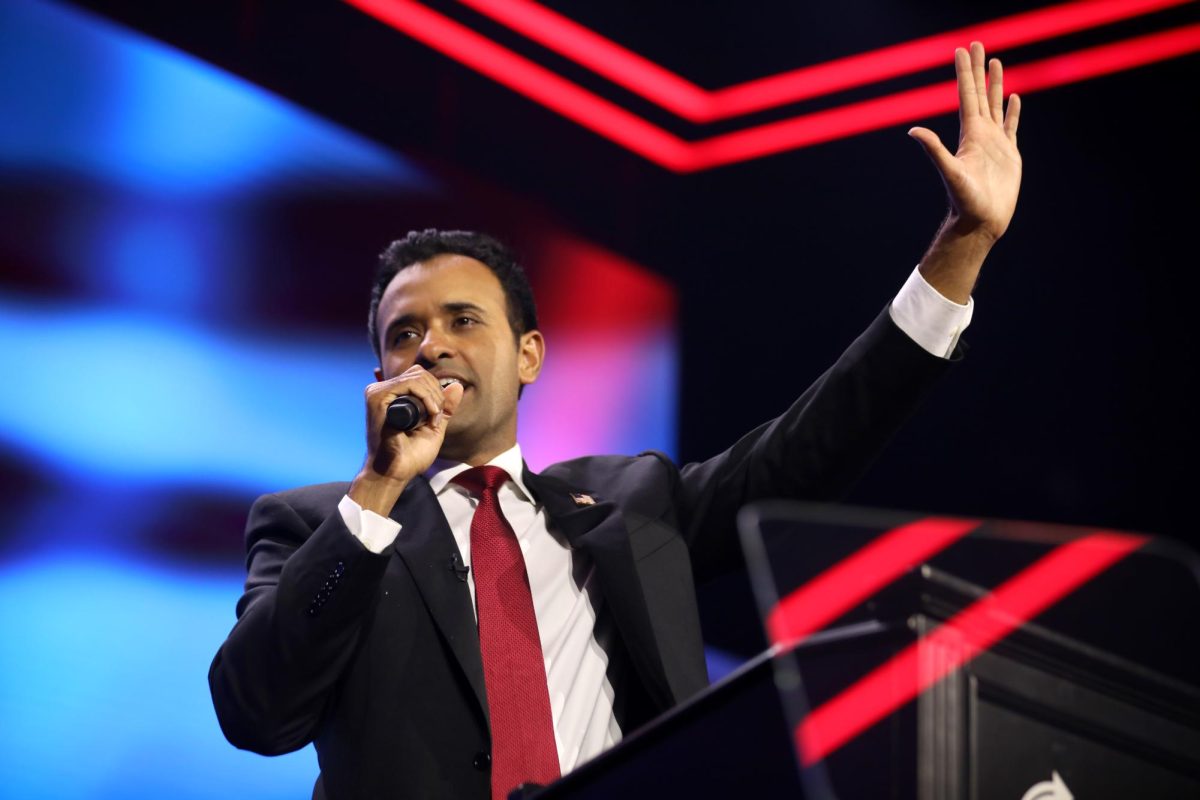For those who watched the first Republican debate in August, Vivek Ramaswamy might have seemed like one of the most Christian candidates on stage. The pharma-executive-turned-upstart-politician declared that his family “[follows] our faith in God,” said “faith-based approaches” could solve the gun crisis, and rattled off his “Ten Commandments” at the end of the speech — including “there are two genders” and “God is real.”
So it might be surprising that Ramaswamy is, in fact, a practicing Hindu. He doesn’t try to hide it, either: he talks about his faith extensively on the campaign trail, making references to Hindu texts and his heritage as a second-generation Indian-American. This is a balancing act for Ramaswamy, considering that over half of Republicans either sympathize with or agree with the statement that the United States should be “strictly Christian.” A Hindu president seemingly shouldn’t factor into that vision.
This raises the question: how can a non-Evangelical candidate like Ramaswamy win in a Republican party driven by Christian ideals? The answer, it seems, is to make yourself seem as Christian as possible.
For a non-Christian, Ramaswamy’s messaging is decidedly Evangelical: Ramaswamy talks about believing in “Judeo-Christian values” just as much as he mentions his Hinduism. And, in an effort to portray those values, Ramaswamy seems ready to ignore the traditions of his own faith. For example, Ramaswamy has stated in interviews that Jesus Christ was “a son of God, absolutely.” (Some practitioners of Hinduism see Jesus as an important spiritual teacher, although not as the singular deity that he is in most Christian belief systems. Ramaswamy was not quoted as having clarified that.) Rule seven of his “Ten Commandments” claims that “the nuclear family is the greatest form of governance known to man,” despite the fact that a majority of Hindus globally live in extended-family homes, according to the Pew Research Center. Another aforementioned commandment of his — “there are two genders” — neglects a history of gender variance in Hindu texts.
Of course, Ramaswamy shouldn’t be forced to adhere to every bit of tradition attached to his faith. But the way he talks about religion fits a disturbing pattern: it seems like Ramaswamy is trying to make his Hinduism seem, well, more Evangelical. And, in some cases, it’s working.
In a CNN column published in late August, conservative Christian columnist Carrie Sheffield chastised some fellow Christians for rejecting Ramaswamy based on his faith alone. Fair enough. But her defense of Ramaswamy — rooted in a “he’s not that different from us” mentality — is troubling.
In the column, Sheffield emphasizes that Ramaswamy “not only recognizes but honors America’s biblical underpinnings,” citing his belief that America was founded on Christian values. (To clarify: this nation’s founding is not based on Christianity; although many of America’s founders were Christian, their explicit intention was to create a government untethered from religion.) She lauds Ramaswamy for “[cherishing] the Judeo-Christian value system,” and she later claims that Biden — an actual, professed, practicing Christian — doesn’t share those values because he supports abortion rights. In essence, according to Sheffield, putting “Christian values” (read: conservative Evangelical values) “into practice” is more valuable to conservative Christians than even being Christian.
That much was evident when Evangelicals rallied behind former President Donald Trump, despite his history of adultery, constant lying and general lack of remorse for anything. Republicans’ defense of Ramaswamy further proves that a non-Christian vessel can perpetuate conservative Christian supremacy — as long as they align politically with Evangelicalism.
On the flip side, Sheffield’s argument insinuates that anyone who doesn’t have “Christian values” — no matter their faith — cannot and should not be president. Imagine if a religious-minority candidate were to run for President while refusing to profess a belief in Christian morals — the same conservatives supporting Ramaswamy’s right to run in this election would probably rail against their candidacy.
That’s not to say Ramaswamy hasn’t faced bigoted attacks based on his faith — he certainly has. For example, anti-abortion activist Abby Johnson, invoking “Satan’s confusion” as a justification, said that Ramaswamy is “not the right guy” for the White House because Hindus believe in “many Gods.” (For the record, that’s a gross oversimplification — scholars say Hinduism is far too complex to be labeled as either monotheistic or polytheistic as a whole.)
But those direct attacks have largely come from the fringes and don’t seem to have affected Ramaswamy’s popularity. Even in a Republican party dominated by Christians (over 80% of the GOP voting base identifies as such, according to a 2020 Public Religion Research Institute poll), Ramaswamy has consistently risen in the polls. There’s only one explanation: Ramaswamy is winning them over.
In some ways, that’s a win for religious diversity — an Indian-American, non-Christian Republican presidential candidate doing as well as Ramaswamy (he’s polling consistently around third place, behind Trump and Florida Governor Ron Desantis) is a remarkable positive development for our nation. But it’s disappointing that, to make himself palatable for Republican voters, Ramaswamy has to force his faith to comply with Evangelical talking points.
When creating the United States of America, our Founders thought to draw a boundary between the government and religion — for good reason. Because, while religion can be an important tool to privately inspire a politician’s individual goals, voters should not decide who to put in the White House based on how they present their faith. Unfortunately, there’s a reason why Ramaswamy sounded more Evangelical than most Evangelicals on the debate stage: he has had to bend over backwards making his faith compatible with a Republican brand of social Christianity.
“I grew up into a generation where we were taught to celebrate our diversity and our differences so much that we forgot all of the ways that we are really just the same as Americans,” Ramaswamy said during the Republican debate.
And, ironically, Ramaswamy — and any other religious-minority candidates like him — are compelled by America’s political system to erase their own diversity.










